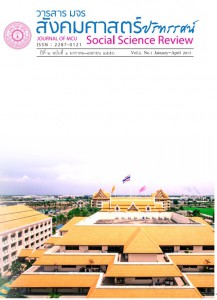Water War of the Mae Ta Chang Basin, Chiang Mai: Concept and Tools for Confict Management in Buddhist Perspective
บทคัดย่อ
Water plays a very essential role in human life.' In his royal speech, King Bhumibhol says: "The important thing is we must have water for drink and agriculture. Wherever people exist, they can live if there is water. But if there is no
water, they cannot live. On the contrary, if there is no electricity, one can live. If, however, there is electricity but no water, one cannot live."2 According to Ismail Serageldin, Vice President of World Bank, the war in
the twentieth century resulted from the fight for oil. Yet the war in the twenty-first century will be the battle for water. In this regards, we sees the water war in several countries, for example, India , Bangladesh', Sudan, Egypt, and Kenya'. The
United Nations thus warns: "In the future, there will be a water crisis which leads to more water wars on international stage.''
In the same way, the New York Times points out the issue regarding the lack of water in 'T'exas in the first year of the twenty-first century: "For 'Texas now, water has become liquid gold instead of oil.'s The expression of this issue is not an
exaggeration when the severe situation of water crisis was found in 1998. It is also believed that the number is rising up to 56 countries within the year 2005. During 1990-2005, the number of population in these water crisis areas would likely
increase from 131 million to 817 million. Since the initiation of the National Economic and Social Development Plan in the late 1950:, Thailand's capitalism and consumerism has expanded continually. Such expansion together with the growth of materialism results in the unbalanced condition" between man, environment, and society, which is followed by the "non-correspondence" between economics, politics, society, culture, tradition, and environment.
เอกสารอ้างอิง
BBC News (5 March 2003) in http://www.news.bbc.co.uk/1/hi/sci/tech/2880831.stm
BBC News, 21 December 2003 in <http://news.bbc.co.uk/ 1/hi/world/africa/3313893.stm>
Cited in Office of Secretary General of House of Representatives, Raai Ngaan Kaan Pbicarana Saeksaa Panbaa Phai Laeng lae Ambokkaphai (Report on the Study of Drought and Flood Problems).
Ekkawit Na 'Thalang, Phum Panya Cbaobaan See Pboomipbaak: WWithee Cheenit laeKrabuan Kaan Rianroo kborng Chaobaan Thai (Local Wisdoms of 4 Regions:Way of Life and the Learning Process of 'Thai People), Bangkok: Sukhothaithammathirat University, 1998, p. 62-63.
Jim Yardly,"For Texas Now, Water, Not Oil, Is Liquid Gold," Nen York Times, 16 April 2001: 1.
Kawaam Runraeng lae Khwaam Khatyaeng (Violence and Confict), Lecture, 18 February 2004. King Prajadhipok's Institute.
National Insttute of Development Administration, Kaan Pramoen Phon Krongkan Pbatthana Laeng Nam Phuea Kaan Awppaphok lae Boriphok (Ihe Evaluation of the Development of Water Resource Project for Consumption). Bangkok:Liang Siang, 1994.
Neil Pelkey,""The Cauvery Water War", in <http://www.des.ucdavis.edu/ staff/pelkey/ cauvery.htm>
Research on Hill Tribe Institute, Kbor Moon Prachaakom Chao Khao nai Pratbet Thai
(The Information about Hill Tribes' population in Thailand), Chiengmai:Research on Hill Tribe Institute, 1998.
Sathanakaan Kan Yaeng Ching Nam Lum Mae Nam 'Taa Chaang (Situation of Usurping Water on the Mae Taa Chaang Basin), Lecture, 29 F'ebruary 2004. The Amity Green Hill Hotel, Chiengmai.
Sirilak Manawongcharoen (tans.), Songkrbraam Nam (Water War). Bangkok: Suan Ngoen Mee Maa, 2003.
Suthat Yoksan, " Iaree WWikrit: Pataban lae Anakho?' (Water Crisis: Present and Future), in Pbuatkaan Raai WWan. 21 May 2003: 9.
Interviews:
Interview Bunjob Bunnaruji, Professor of the Faculty of Arts, Chulalongkorn University, 7 January 2005
Interview Chaipun Prapasawat, Director of the Community Rights' Institute, 17 June 2004
InterviewChotechuang 'Tabwong, Head of the Judge Panel in the Court of Appeals, 31 January 2005
Interview Father Insom Singkham, River Basin Committee, 20 January 2005
Interview Father Tripop Saeyang, River Basin Committee, 19 January 2005
Interview Jamnian Boonkhem, Chief of the Water Source Management Division, 20 January 2005
Interview Jamnong Adiwattanasit, Professor of the Faculty of Social Science,Kasetsart University, 13 January 2004
Interview Jamroen Tonbua, River Basin Committee, 21 January 1985
Interview Mark 'Tamthai, Special Lecturer of King Prajadhipok's Institute, 17 April 2004
Interview Nithi Iawsriwong, President of the Community Rights' Institute, 17 June 2004
Interview Paiboon Wattanasiritham, President of the Committee of the Community Development Organization's Institute, 19 August 2004
Interview Patchara Saikaewyai, River basin Committee, 21 August 2004
Interview Phra Duangdee Santikaro, the Abbot of Prachakasem Monastery, Hangdong District, 20 June 2004
Interview Phra Vititsasanakit, the Abbot of Doi-Pui Monastery, Muang District, 19 January 2005
Interview Silaporn Buasai, Office of the National Research Council of Thailand, NRCT, 24 August 2004
Interview Somparn Promta, Professor of the Faculty of Arts, Chulalongkorn University, 8 February 2005
Interview Supot Kan thasit, River Basin Committee, 27 January 2004
Interview Tawinwadee Burikul, Director of the Research and Development Division, King Prajadhipok's Insttute, 15 May 2004
Interview 'Tiab Awunuan, River Basin Committee, 21 January 1985
Interview Village Headman Intorn Tipkhamma, River Basin Committee, 21 January 2005
Interview Village Headman, Chalerm Unviset, President of the River Basin Mae- 'Ta-Chang Committee, 27 June 2004
Interview Wanchai Wattanasup, Director of the Peaceful Means and Good Governance, 18 November 2003
ดาวน์โหลด
เผยแพร่แล้ว
รูปแบบการอ้างอิง
ฉบับ
ประเภทบทความ
สัญญาอนุญาต
ลิขสิทธิ์ (c) 2018 วารสาร มจร สังคมศาสตร์ปริทรรศน์

อนุญาตภายใต้เงื่อนไข Creative Commons Attribution-NonCommercial-NoDerivatives 4.0 International License.
เพื่อให้เป็นไปตามกฎหมายลิขสิทธิ์ ผู้นิพนธ์ทุกท่านต้องลงลายมือชื่อในแบบฟอร์มใบมอบลิขสิทธิ์บทความให้แก่วารสารฯ พร้อมกับบทความต้นฉบับที่ได้แก้ไขครั้งสุดท้าย นอกจากนี้ ผู้นิพนธ์ทุกท่านต้องยืนยันว่าบทความต้นฉบับที่ส่งมาตีพิมพ์นั้น ได้ส่งมาตีพิมพ์เฉพาะในวารสาร มจร สังคมศาสตร์ปริทรรศน์ เพียงแห่งเดียวเท่านั้น หากมีการใช้ภาพหรือตารางหรือเนื้อหาอื่นๆ ของผู้นิพนธ์อื่นที่ปรากฏในสิ่งตีพิมพ์อื่นมาแล้ว ผู้นิพนธ์ต้องขออนุญาตเจ้าของลิขสิทธิ์ก่อน พร้อมทั้งแสดงหนังสือที่ได้รับการยินยอมต่อบรรณาธิการ ก่อนที่บทความจะได้รับการตีพิมพ์ หากไม่เป็นไปตามข้อกำหนดเบื้องต้น ทางวารสารจะถอดบทความของท่านออกโดยไม่มีข้อยกเว้นใดๆ ทั้งสิ้น





